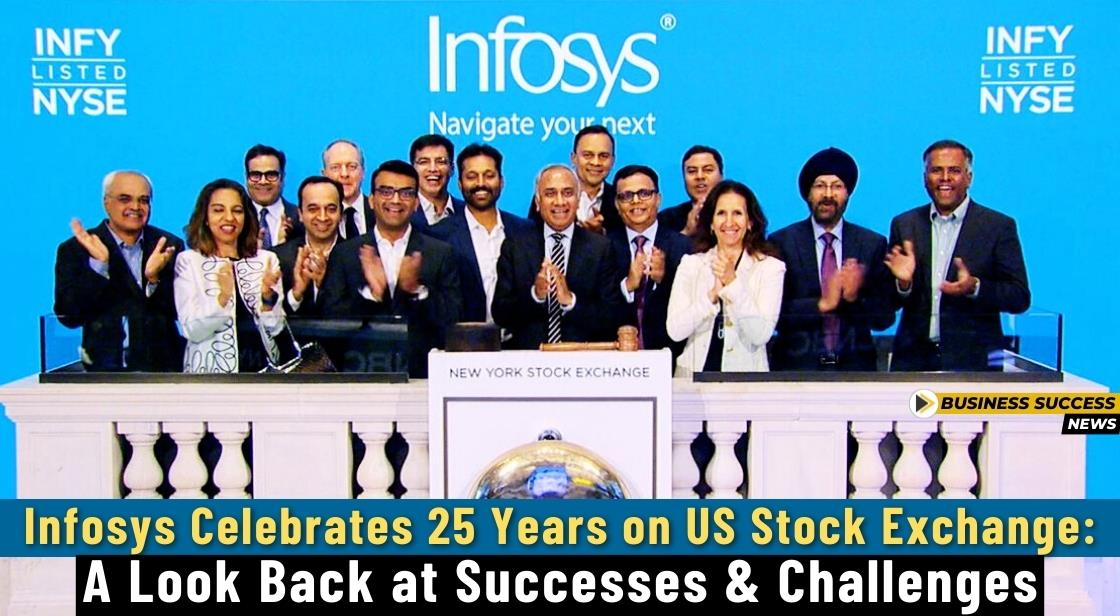Infosys Celebrates 25 Years on US Stock Exchange: A Look Back at Successes and Challenges

News Synopsis
Infosys, a leading Indian IT services company, recently celebrated a significant milestone: 25 years of being listed on the US stock exchange. This journey, which began in 1999, is marked by both remarkable achievements and periods of challenge.
Infosys' 25-Year Journey: From Humble Beginnings to Global Recognition
A Strategic Move for Western Clients
Founded in 1981, Infosys quickly established itself as a force in the Indian IT sector. By 1993, it had gone public domestically. However, with a significant portion of its business coming from the US, Infosys recognized the strategic advantage of listing on a US exchange. As stated by T.V. Mohandas Pai, a former Infosys CFO, the goal was to "instill confidence" in Western clients by demonstrating its status as a publicly traded company.
A Company Built on Innovation
Infosys' success can be attributed to several factors, including its commitment to innovation. The company was one of the first in India to prioritize corporate governance and transparency. This included establishing clear governance policies, disclosing board member information, and even publishing their salaries. Infosys also adopted US GAAP accounting standards and released sustainability reports, setting a high bar for Indian companies.
A Culture of Equality
Infosys fostered a unique work environment that emphasized equality. Unlike many companies at the time, Infosys did not maintain separate facilities for senior and junior employees. This approach fostered a sense of camaraderie and collaboration.
Financial Performance and Market Leadership
Infosys' commitment to innovation and transparency translated into strong financial performance. The company consistently reported year-on-year growth and established a practice of providing annual revenue forecasts. This attracted investors and solidified Infosys' position as a leader in the Indian IT sector. By 2023, Infosys had grown to become the country's second-largest IT services company, generating revenue of $18.6 billion.
Challenges on the Road to Success
While Infosys' story is one of remarkable success, the company has also faced challenges.
A Flawed Leadership Approach
Analysts point to a misstep in Infosys' early leadership strategy – the plan for all co-founders to serve as CEO. While the company thrived under Nandan Nilekani's leadership, it faltered after Kris Gopalakrishnan took over in 2007. Infosys began losing market share to rivals like Cognizant and TCS, who were quicker to embrace digital offerings. By the time S.D. Shibulal became CEO in 2011, the gap between Infosys and its competitors had widened.
Turmoil Under Professional Leadership
The appointment of a professional chairman and CEO in 2011 (R. Seshasayee and Vishal Sikka, respectively) brought further turmoil. Disagreements between the co-founders and the new leadership regarding business strategy and compensation packages led to both Seshasayee and Sikka's departures. Nandan Nilekani returned as non-executive chairman in 2017 to steer the company back on track.
Nilekani's Return and Continued Growth
Nilekani's return marked a turning point. He focused on finding a new CEO, reconstituting the board, and stabilizing the business. Under his leadership, Infosys became the second Indian IT company (after TCS) to cross a $100 billion market cap. Nilekani also appointed Salil Parekh as CEO, whose focus on execution and large deals has secured him a term extension until March 2027.
Investment Returns
For investors, Infosys has been a rewarding journey. An investor who bought a single Infosys share on NASDAQ in June 1999 would have seen a staggering 2,239-fold return by June 2024. This translates to a 433-fold return in rupee terms compared to an investment in the Indian market during the same period.
Embracing Generative AI for Competitive Advantage
Generative AI presents both opportunities and challenges for Infosys. On the one hand, this technology has the potential to revolutionize various aspects of the IT services industry. Here are a few possibilities:
-
Enhanced Automation: Generative AI can automate repetitive tasks currently handled by human employees, freeing them to focus on more strategic initiatives.
-
Improved Efficiency and Productivity: AI-powered tools can streamline workflows, optimize processes, and accelerate project completion times.
-
Personalized Client Solutions: Generative AI can facilitate the development of customized solutions that cater to specific client needs and industry trends.
-
Innovation and New Service Offerings: By leveraging generative AI capabilities, Infosys can develop entirely new service offerings that drive value for clients.
Challenges and Considerations
However, successfully integrating generative AI will require Infosys to address several challenges:
-
Reskilling and Upskilling Workforce: As AI automates tasks, Infosys will need to invest in reskilling and upskilling its workforce to ensure employees possess the necessary skills to work alongside and manage AI tools effectively.
-
Ethical Considerations: Generative AI raises ethical concerns surrounding bias, data privacy, and potential job displacement. Infosys will need to implement robust ethical frameworks to ensure responsible development and deployment of AI solutions.
-
Integration with Existing Systems: Integrating generative AI seamlessly with existing IT infrastructure will require careful planning and execution.
Infosys' Approach to Generative AI
Infosys appears to be taking a proactive approach to generative AI. The company has established its "Generative AI Labs" and "Generative AI Business Operations Platform" dedicated to exploring and implementing this technology. These initiatives suggest Infosys' commitment to staying ahead of the curve and capitalizing on the potential of generative AI.
Conclusion
Infosys' 25-year journey on the US stock exchange is a testament to its ability to adapt and innovate. As the company navigates the era of generative AI, its success will hinge on its ability to embrace this technology while addressing the associated challenges. By effectively integrating generative AI and upskilling its workforce, Infosys can solidify its position as a leader in the ever-evolving IT services landscape.
You May Like









